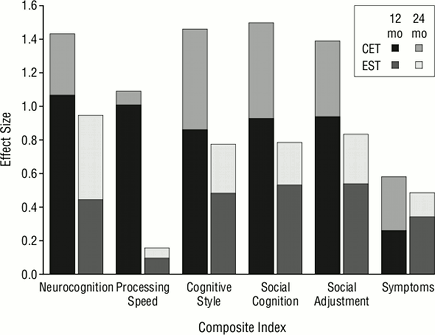If you are looking for a cost effective and rewarding way to jump-start the psychosocial recovery of your clients living with severe mental illness, then Cognitive Enhancement Therapy (CET) could be the answer. Our CET Manual is a well tested, comprehensive, step-by-step, user friendly guide that will help your clients acquire the skills needed to advance social cognitive and neurocognitive functioning. Using a small group approach, CET uniquely integrates computer-assisted neurocognitive training with social cognitive group sessions. A reading of the CET Manual and review of the exercises should leave you convinced about the opportunity for real client change, and confident that you can indeed apply this cutting edge, empirically tested cognitive rehabilitation approach.
What Is CET?
CET is a performance based, comprehensive, developmental approach to the rehabilitation of social cognitive and neurocognitive deficits. CET is designed as a recovery phase intervention for persons with schizophrenia or schizoaffective disorder who are symptomatically stable, but who nonetheless remain socially and vocationally disabled. Patients need to be outpatients stabilized on medication, have an IQ of at least 80, and not be abusing drugs and alcohol. Participants work at recovery through structured group and computer exercises. CET is the culmination of more than 30 years of clinical experience and research in schizophrenia treatment development by the psychosocial treatment pioneer and University of Pittsburgh Department of Psychiatry Professor Emeritus, Gerard E. Hogarty, M.S.W. Overall, CET attempts to increase mental stamina, active information processing, and the spontaneous negotiation of unrehearsed social challenges. It does so with a focus on enhancing perspective taking, social context appraisal, and other components of social cognition.
Does It Work?
CET has been shown to have remarkable and enduring effects in a two year randomized study of 121 persons with schizophrenia or schizoaffective disorder treated with either CET or Enriched Supportive Therapy (EST). Once CET participants completed the social cognitive groups, highly significant effects were observed for CET on five composite measures (Neurocognition, Processing Speed, Cognitive Style, Social Cognition, and Social Adjustment) at two years. See Figure 1 (Hogarty et al. Archives of General Psychiatry, 2004;61:866-876. Reprinted with permission).
Comparative Benefits of CET vs. EST – Study 1
(Chronic Schizophrenia, N = 121)

Figure 1
Most encouraging, recent findings (Hogarty, Greenwald, and Eack, Psychiatric Services, 2006;57:1751-1757; Eack et al., Schizophrenia Research, 2010;120:210-216) have shown CET effects to persist for at least an additional year following treatment. A subsequent study of the early course of schizophrenia indicates significant neuroprotection against gray matter loss and remarkable gains in employment and other functional outcomes (Eack et al., Psychiatric Services, 2009;60:1468-1476; Eack, Hogarty, et al., Archives of General Psychiatry, 2010;67:674-682). Read more about the evidence supporting the effectiveness of CET.
Is CET Cost Effective?
CET is cost effective because it relies upon a group approach. Most treatment facilities already have computers. The only additional start-up cost is for the neurocognitive computer software (available from independent vendors listed here), the CET Manual, which provides essential session by session instructions for providers, and the supplemental CET CD-ROM, which contains participant handouts and other implementation materials.
In facilities where CET has been used, third-party reimbursements have exceeded costs. CET is approved and recognized by the U.S. Substance Abuse and Mental Health Services Administration (SAMHSA) as an evidence-based practice.
Agencies interested in obtaining CET training should complete an application online. Training inquiries without a completed application will not be considered. Two or more master’s-level clinicians must be available for training at a single site and at least two therapists are required to conduct the CET social-cognitive group sessions. Additional requirements are detailed on the training page.